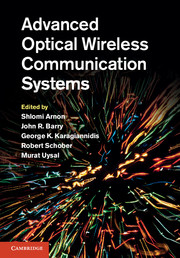Book contents
- Frontmatter
- Contents
- List of contributors
- Part I Outlook
- Part II Optical wireless communication theory
- 2 Coded modulation techniques for optical wireless channels
- 3 Wireless optical CDMA communication systems
- 4 Pointing error statistics
- 5 Equalization and Markov chains in cloud channel
- 6 Multiple-input multiple-output techniques for indoor optical wireless communications
- 7 Channel capacity
- Part III Unique channels
- Part IV Applications
- Index
2 - Coded modulation techniques for optical wireless channels
from Part II - Optical wireless communication theory
Published online by Cambridge University Press: 05 June 2012
- Frontmatter
- Contents
- List of contributors
- Part I Outlook
- Part II Optical wireless communication theory
- 2 Coded modulation techniques for optical wireless channels
- 3 Wireless optical CDMA communication systems
- 4 Pointing error statistics
- 5 Equalization and Markov chains in cloud channel
- 6 Multiple-input multiple-output techniques for indoor optical wireless communications
- 7 Channel capacity
- Part III Unique channels
- Part IV Applications
- Index
Summary
The transport capabilities of optical communication systems have increased tremendously in the past two decades, primarily due to advances in optical devices and technologies, and have enabled the Internet as we know it today with all its impacts on the modern society. Future internet technologies should be able to support a wide range of services containing a large amount of multimedia over different network types at high transmission speeds. The future optical networks should allow the interoperability of radio frequency (RF), fiber-optic and free-space optical (FSO) technologies. However, the incompatibility of RF/microwave and fiber-optics technologies is an important limiting factor in efforts to further increase future transport capabilities of such hybrid networks. Because of its flexibility, FSO communication is a technology that can potentially solve the incompatibility problems between RF and optical technologies. Moreover, FSO technologies can address any type of connectivity needs in optical networks. To elaborate, in metropolitan area networks (MANs), FSO communications can be used to extend the existing MAN rings; in enterprise networks, FSO can be used to enable local area network (LAN)-to-LAN connectivity and intercampus connectivity; and, last but not the least, FSO is an excellent candidate for the last-mile connectivity.
Information
- Type
- Chapter
- Information
- Advanced Optical Wireless Communication Systems , pp. 11 - 53Publisher: Cambridge University PressPrint publication year: 2012
Accessibility standard: Unknown
Why this information is here
This section outlines the accessibility features of this content - including support for screen readers, full keyboard navigation and high-contrast display options. This may not be relevant for you.Accessibility Information
- 3
- Cited by
